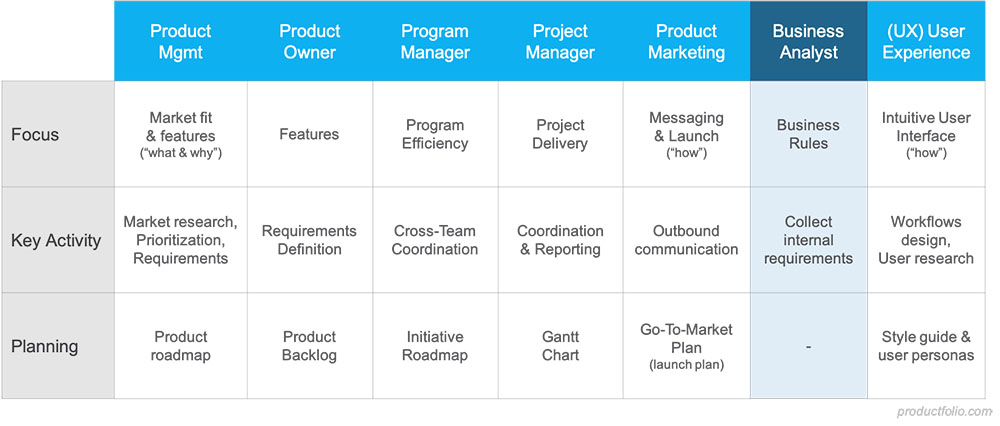Product Manager vs Business Analyst
A Product Manager (PM) and a Business Analyst (BA) are two separate roles united by a mutual goal which is to build the right systems and products. However, there are two key differences: (a) Business Analysts are contributors, not decision-making leaders and (b) business analysts support the needs of the business whereas Product Managers serve the needs of external customers. In fact it is because Product Managers are so close to the needs of customers that they are endowed with decision making authority, recognizing that is the most efficient way to mean customer needs.
BAs are typically found in traditional waterfall-style IT shops, whereas PMs own the success of an outward-facing product and bear the responsibility and decision authority while closely collaborating with Agile teams.

Internal versus External Focus
Product Managers focus outwards/externally as they closely examine the market and interact one-on-one with customers with a view of accessing product opportunities. For PMs, the ultimate goal of their role is the product itself. Besides product managers understanding why customers use a product, they’re are responsible of defining how consumers shall use it as they continuously define, improve and monitor product use as well as keep an eye on the success metrics.
Business analysts are inwards-facing as they concentrate on ongoing efforts within the company. These include internal systems, processes and practices to find the best approach of how to design and support what the PM has requested on behalf of end-users and the market. In IT environments, BAs are tasked with identifying opportunities in order to automate processes and functions.
Business Requirements versus Technical Specifications
Product managers seek to identify the biggest problems that need to be solved and see to it that the team has come up with the relevant solution. PMs own the product vision and formulate a roadmap of a product’s entire life. Project managers like to find out what’s next, the direction a product is taking, customer requests and whether those requests align with strategic initiatives. They also find out why specific features are being built at the moment.
Business Analysts are expected to gather technical specifications to facilitate the product development process. As PMs focus on the “why” of a solution, business analysts collaborate closely with engineers to figure out the “how” of a solution from a functional user perspective. BAs also seek to find out whether there are any business challenges faced during the project including any technical constraints and, how they can be documented and presented to the team for appropriate action as well as verify whether risks have been identified.
Product Perspective of PM and BA
A PM sets out the product strategy and roadmap including helping to define product’s features and functionalities. PMs conduct industry and competitive analysis and proceed onto defining a product’s unique strengths that will set it apart from competitor products. On the other hand, business analysts’ domain is data whereby they’re expected to avail relevant data to the product manager to enable them build a high-quality product.
Business analysts also review a product from multiple angles/perspectives and assist the PM to understand a product’s strength, weaknesses and how it can be improved. A BA is an important role that supplies the product manager with vital information that includes which documents shall be prepared and how the project shall be tracked and reported.
Product Managers collaborate with the various teams/experts involved in product creation. They prioritize and strategically decide what needs to be built first. PMs also ensure the entire team works in harmony to achieve the set goals, clearly communicate requirements to the team and negotiates with stakeholders to balance their demands and expectations. Business analysts are mainly focused on the end product by ensuring the final products solve any challenges faced by businesses.


